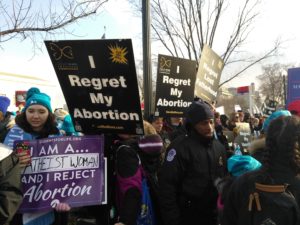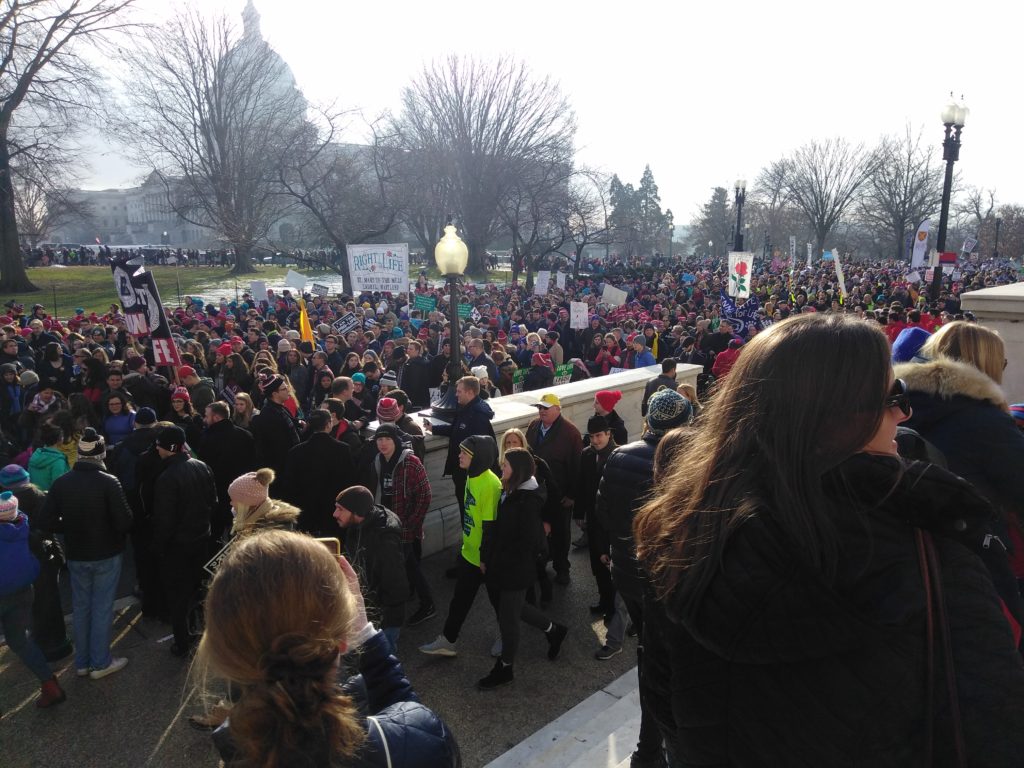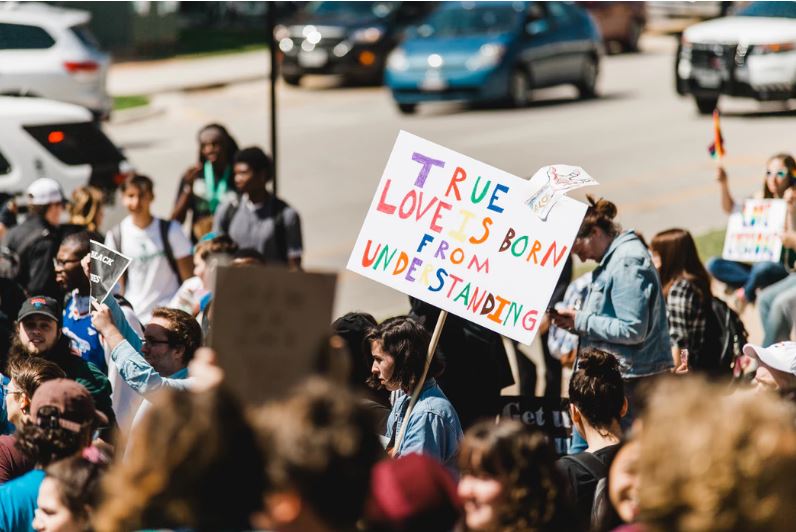I am not an activist. Before this past Friday, I had never attended a public protest or rally for any specific issue (even those I care about deeply). I did attend (unenthusiastically) a Mitt Romney rally once when he was running for president, but that’s the extent of my public activism, save this website. To my shame, during my 30 years of pastoral ministry, I rarely encouraged my congregation to publicly oppose abortion. I don’t recall having preached a sermon solely on the right to life. Oh, sure, I added a “Right to Life” insert to the bulletin on the third Sunday of January every year and mentioned abortion in the context of a sermon when it was appropriate, but that was about it. Don’t get me wrong, I never backed down from the truth when asked or when it was specifically called for, but it wasn’t my “cause” or passion. I just assumed it was a “given” that abortion was wrong and that most Christians already acknowledged that. I didn’t want our church to become the “anti-abortion church,” because it was uncomfortable to discuss and was off-putting to the non-Christians we were trying to reach with the Gospel. I wanted to keep the main thing the main thing.
But something has changed over the past several years. More and more I hear pastors minimalizing the scourge of abortion and comparing it to the horrors of climate change, as if the two issues were of equal importance or were mutually exclusive – even in my own denomination. The “Christian Left” has infiltrated our holiness churches with a leftist agenda that minimalizes sin. It even claims on its website (www.thechristianleft.org), “Abortion is a made up issue designed to coalesce a right-wing political movement. It isn’t even mentioned in the Bible unless you consider the obvious implications of the ordeal of the bitter water in Numbers 5.” Of course it isn’t mentioned in the Bible. Why would God’s people ever intentionally kill their own unborn babies? The Israelites viewed life as precious, even life in the womb (see Psalm 139:13-14 and Jeremiah 1:5 as examples). And let me add that I believe there’s a huge difference between causing harm that results in an unintentional miscarriage (resulting in only a fine in the Old Testament law) and the purposeful, intentional destruction of life in the womb for no other purpose than convenience. The attempts of the “Christian Left” to make abortion a political issue rather than a moral one is repulsive. Today it is no longer a valid assumption that most Christians (or pastors) believe abortion is wrong. When pastors themselves become callous to the plight of the unborn and begin promoting pro-choice views, someone has to step up and do something.
Every single year since 1973, Christians from around the country have marched on Washington to commemorate the Roe v. Wade Supreme Court decision that legalized abortion. They’ve shown up year after year to be a voice for the voiceless and to advocate for the reversal of Roe v. Wade. Quite uncharacteristically, I decided to attend the 2019 March for Life in Washington, D.C.. I had been listening to Ben Shapiro a few months ago when he announced he would be speaking at the event. As the words, “I would love to hear him in person,” tumbled from my mouth, I immediately heard that inner voice say, “Go. Now is the time.” I instantly knew that this was the time to speak up and stand up and resist the status quo. I believe that now is the time when God will begin to change the heart of our nation. Just as a moment came in our nation’s history when we could no longer turn a blind eye to slavery, I believe we have reached that moment when we can no longer tolerate abortion on demand. What was originally intended to be “rare and safe” has resulted in over 60 million deaths of unborn babies since 1973 in the United States alone.
So, on Friday, January 18, my husband Dan and I marched to stand for the fundamental truth that all life is created by God and is sacred. We marched to stand for the most vulnerable of human beings who are being denied the “life, liberty, and the pursuit of happiness” guaranteed to all other United States Citizens. We marched because it is time to stand with those who stand for life.
Here are some of the observations and emotional moments that left an impact on me.
1. The pendulum is swinging: young people and millennials dominated the march
Many of the “Christian Left” will find themselves on the wrong side of history on this issue. In 1973, it might have been easy to claim that an unborn baby was just a blob of cells and not really a human being. But science has proven otherwise. Have you seen a 3-D ultrasound lately? Surgeons today correct congenital birth defects by operating on babies still in the womb. Premature babies are rushed to state-of-the-art NICU units where they’re given chances for survival that were unthinkable a couple of generations ago. Apparently, younger generations are more science-minded than their predecessors. I was completely surprised and overwhelmed by the age of those who attended the rally and march. They were young – millennials, teens, children. And they were passionate. They carried signs saying, “We are the pro-life generation.” I believe they’re right. They are the ones who will see abortion ended in their lifetimes. And it’s because they’re not afraid or ashamed to speak up and say its wrong. If the church remains largely silent about this issue, they’ll be hard-pressed to win those in the next generation who are standing for a principle as fundamental as life itself.
2. If it weren’t for the Catholics, there would be no national voice for the preborn: where are the evangelicals?
I was surprised by the huge number of Roman Catholics involved in the March for Life. We were greeted by the Knights of Columbus with a free backpack, stocking cap, and literature. Since the early 1980s, they’ve made it their mission to provide over 1000 ultrasound machines for pregnancy care clinics (a goal they met this past year) so women could see their babies before making the decision to terminate their pregnancies. They’ve saved thousands and thousands of lives by doing so and now are looking forward to saving over a million.

While the Wesleyans are relatively uninvolved in the pro-life movement, I think it’s worth noting here the tremendous ministry Oklahoma Wesleyan University has had through it’s Save the Storks ministry. So far, they’ve built over 40 mobile medical units to provide free pregnancy testing and ultrasounds in abortion-prone communities, saving the lives of over 4,000 babies.
During the march, we heard fellow marchers reciting the rosary and the Lord’s Prayer. While we did find one small group of teens who were “Wesleyan Methodists” we saw little other evidence of involvement by evangelicals other than “Lutherans for Life.” Over 90% of those involved appeared to be Catholic. It begs the question, “Where is the evangelical church?” I believe most of us just aren’t the protesting type. But maybe we need to start taking a stand. It’s been said that silence lends consent. At the very least, it communicates that we’re neutral or uninterested. And our lack of presence emboldens the pro-abortion feminists with their rabid abortion-on-demand agenda.
3. The abortion industry has an agenda: we need to convert the abortion workers
One of the most compelling speakers at the March for Life rally was Dr. Kathi Aultman, an OB-GYN and former medical director for Planned Parenthood in Jacksonville, Florida. [You can watch her entire message here.] She recounted her story and how, in her neonatal rotation, she found herself trying to save premature babies of the same gestational age as those she was aborting. After the birth of her daughter, she finally made the connection between “fetus” and “baby” and could no longer consent to do abortions. “The fact that the baby was unwanted was no longer reason enough for me to kill it,” she said.
Dr. Aultman also brought to light the pressure to adopt a pro-abortion stance and to reject pro-life sentiments: “Medical students and residents are taught that abortion is a normal part of women’s health care. The pro-life view is discouraged. It’s difficult for pro-life students to get into medical schools and residencies, especially OB-GYN. Professors can lose their positions if they express pro-life opinions. ACOG, the American College of Obstetricians and Gynecologists, who should be the most pro-life, are staunchly pro-abortion. All OB-GYN residents are required to do abortions unless they opt out because of conscience. But that is discouraged, and we need to protect those conscience rights.”
So, it seems as if there is a pro-abortion agenda to completely discount and penalize any pro-life sentiment on the part of the medical community. It is coercion to accept an opinion and perpetrate an act that often goes against the physician’s oath to “first, do no harm.” We must remember that those who are performing abortions are in some cases victims, too. They’ve been brainwashed and desensitized to the realities of abortion.
Abby Johnson, whose story is the subject of the soon-to-be-released movie “Unplanned,” has a goal for the pro-life movement to facilitate the conversions of thousands of abortionists. She was once a Planned Parenthood director who (in her own words) coerced, manipulated, and exploited women into having abortions. After seeing a 13-week-old baby struggle for his life in the womb during an abortion, her life was forever changed. She founded a ministry called “And Then There Were None.” Their goal is “to love abortion clinic workers out of the abortion industry and into a place of healing.” So far, they’ve helped facilitate the conversion of almost 500 abortion workers.
4. The two moments that brought me to tears: making it personal
My first emotional moment came before the rally had even started. One of the singers in the pre-rally concert had asked us to close our eyes and imagine we were seated with our family around a table in heaven and then to imagine looking down the table and seeing strangers sitting with us– or something like that. I hadn’t been paying much attention until then, and I admit that I have no idea what his point was, but he turned my thoughts toward heaven. And in that moment, God gave me a new perspective.
Up to this point, I had been thinking about how grateful I was that my parents didn’t choose to abort my twin sister and me. They were both 18 by the time we were born, certainly unprepared to start a family. Abortion wasn’t legal for a first pregnancy at the time (thankfully), but there were other alternatives our parents could have sought out. I’m very grateful that we were allowed to live. But there was a bigger consideration.
Ben Shapiro had mentioned in his earlier live podcast about being the “voice for the voiceless” and referenced the millions of aborted souls who are looking down on us. And now it hit me: I have a little brother or sister in heaven who I have never once thought about. I remember back in the 1960s (pre-Roe v. Wade) when my mom was hospitalized for a couple of days, but it wasn’t until the 1990s that I learned that her hospitalization involved an abortion. My dad explained it to me this way, “I thought it was what your mom wanted, and she thought it was what I wanted. But neither of us really wanted an abortion.” I was sad to hear about the loss of life, but I honestly never gave it a serious second thought. My parents didn’t become Christians until they were in their mid-thirties, after all. Everything was forgiven. But now, I couldn’t get past the thought that there was a soul in heaven who had been looking down on me all these years wondering why I didn’t care. Why wasn’t I being his or her voice? Why didn’t I care about the injustice? And it broke my heart. Even now as I’m typing my eyes are welling up with tears. That soul matters to God, and I ought to think about him or her every time I read about a young woman having an abortion. These are people – human beings – who are being terminated. Every one of them matters to God, and they should matter to me. So, I’ve affectionately named him or her “Sammy” (after my grandfather). I mourn the life Samuel or Samantha never got to live. I mourn the relationship I never got to nurture, the memories we never got to share. And I think about him or her looking down on me and feeling the love in my heart that I now have for someone I never got to love on earth.

The second emotional moment for me came at the end of the march. There were many pro-life advocates lined up in front of the Supreme Court building quietly holding signs and facing those who marched by. One group of about seven women caught my attention. Their signs were all black with simple white lettering that read, “I regret my abortion.” My eyes locked with those of a solemn woman who appeared to be my age or a little older. The look on her face was so incredibly sad that it touched my soul. I don’t know what I was thinking, but I couldn’t stop myself from rushing to her and hugging her with all my strength. When she saw me approaching, she reached for me to accept my hug and we were connected soul to soul. We both just cried. I thanked her for being so brave and for taking a stand. I reminded her of God’s forgiveness. And she encouraged me, because she could see how much her situation had touched my heart. Sometimes I think we forget that there are two victims in abortion – the unborn baby and the woman who has to live with the knowledge that she killed a part of herself as well as another human being. She may have made the choice, but she has also been exploited by an industry that conceals the realities of abortion and tells women their “blog of tissue” can’t feel pain and isn’t really a person yet and that this is the best option, etc. They often pressure young women to do what’s “best for them.” But women know better. Many are filled with regret. Others become fierce advocates for abortion, thinking that social acceptance will alleviate their guilt. But it won’t. That’s why so many are angry and hateful and rabid about their beliefs.
5. Abortions create more victims than just the unborn baby: my conclusion
Abortion is not the empowerment of women; it’s the exploitation of women. It asks women to violate their most basic instincts to love and protect the babies they’re carrying in their wombs. They’re lured into a choice that will leave them emotionally scarred. They’re made to feel they have no choice or that the choice to abort is the only rational choice for an enlightened woman. Female healthcare providers are coerced into performing abortions as routine health care and ostracized professionally if they object on moral grounds. Women are being victimized, whether they realize it or not. They need repentance and forgiveness for sure, but they also need grace and healing and wholeness.
As a natural introvert, I shy away from crowds, and I avoid confrontation. As a Floridian for the past 17 years, I “freeze” in temperatures below 70 degrees. So, you can imagine how uncomfortable I was in a crowd of hundreds of thousands of protesters in the middle of January in Washington D.C. But I’m not on this earth to be comfortable. I want the crowd to be so big that the Left will have to admit that the pro-life position isn’t a “radical” opinion. It’s not even the minority opinion. I want to be part of that crowd that refuses to be ignored.

I’m already planning to attend next year’s March for Life on January 24, 2020. But protesting or marching once a year isn’t enough, at least not for me. I’m praying about my next steps and what God wants me to do, and I hope you’ll join me in praying about how we can confront women with the truth while also ministering to those who have been victimized and how we can awaken the church to take action. Will you join me on this journey? I’ve included below some quotes from the rally that might encourage you as you talk to others, some links you might appreciate, and some action steps and discussion questions for your first steps. I believe we can make a difference if we stand together. Many of our government officials are standing with us. Now is the time for the Evangelical church to rise up and speak up and put an end to the abortion industry that violates the very soul of our country.
Quotes Worth Remembering
- “… only one group was left behind. That group had once been the most prized possession of a great and moral people – its children – the souls entrusted to us by the Creator, given to us with care and love. We built the country for our children. We built our lives for our children. And then something happened. We, as a country, decided to erase them. We decided that the present was more important than the future. We decided that convenience was more important than basic decency. We decided that we could safely blot out millions of souls who could not protect themselves, still forever voices that could not speak. We dehumanized the most human, the most innocent among us. We lied to ourselves…and we pretended that these were not human beings, human lives, at all, but disposable balls of meat.” – Ben Shapiro
- “So, perhaps we are out of line with the rest of society, to which I say, ‘Good.’ So were the abolitionists; so were the civil rights marchers, so were the martyrs in Rome and the Jews in Egypt. Righteousness doesn’t have to be popular; it just has to be righteous.” – Ben Shapiro
- “The humanity of the unborn child is beyond doubt, yet the pro-abortion movement, like some kind of modern-day Flat Earth Society, continues to cling to outdated, indefensible arguments cloaked in euphemism.” – Congressman Chris Smith (R-NJ)
- “I tell people in my state, when they ask me, ‘Why are you, a black female Democrat, fighting for life?’ I say. ‘Because I’m a Christian first.'” – Louisana State Representative Katrina Jackson (D)
- “The culture of death might suggest that my life wouldn’t have been worth living because of my condition. It’s the argument we hear so often today, that aborting children to save them from hardship is an act of generosity, but science stops this argument in its tracks by reminding us that it’s human life being taken, and there is no justification for ending a life just because it’s deemed unworthy by another.” – Allie Cavazos, chemical and biological engineering student at Princeton University and president of Princeton Pro-Life, who was born with brittle bone disease
- “… our goal in this movement must be transformation. The battle will not be won on social media. It won’t be won through heated arguments. Faith and science proves our point and shows that we are on the winning side.” – Abby Johnson, founder of “And Then There Were None”
Links Worth Visiting
- Watch the entire March for Life Rally
- Watch a 60-second time-lapse video of the entire the march on Constitution Avenue
- Statistics on abortions in the U.S. to support pro-life claims
- Worldometer running count of the number of abortions worldwide since the beginning of the year (note that the number is over two million for just the month of January)
What can you do?
- Pray that God would soften your heart toward the unborn. It’s much easier to ignore the plight of millions of unborn babies, but that doesn’t make it right. Pray for fresh eyes to see the world condition as God does. He can break up the “fallow ground” and resensitize your heart and fill you with compassion, resolve, and a sense of urgency.
- Learn more about the issue and how you can become involved. Not everyone is called to do the same thing, so find a ministry that resonates with you.
- Don’t shy away from conversations about abortion, even if your opinion is in the minority. Ask questions, but don’t compromise your convictions.
- Love the women who have been exploited by the abortion industry and the Leftist agenda. Show empathy and the grace of God to fully forgive.
- Join a life-affirming organization that will help you know what you can do to take a stand.
- Invite a group to go see the “Unplanned” movie coming out on March 29. You might also want to watch the movie “Gosnell” that came out this past fall.
- Pray for God to touch the hearts of local church and denominational leadership. Pray for like-minded Christians to join together so the Evangelical church response mirrors or exceeds that of the Roman Catholic Church in intensity.
Questions for Discussion
- If life doesn’t begin at conception, when does it begin? At what point should it be protected?
- Why is a baby called a baby if it’s wanted by its mother but a fetus if it isn’t?
- Why did I just refer to a baby as an “it” instead of a human he/she/they?
- Why don’t fathers have a say in what happens to the lives of their babies?
- If an unborn baby has it’s own heart and brain and DNA and blood type, why is it still considered the “mother’s body”? Do we have a right to do something with our own body that destroys the unique body of another person?
- Does the church bear any responsibility for abortions among Christians because of their disdain for (and sometimes shunning of) those who become pregnant out of wedlock? How can we show more love, compassion, and support for those who are pregnant without condoning the behavior?
- What can we do to lovingly teach women the sacredness of life and dissuade them from ending it for their baby?
- How can we help make abortions socially unacceptable?
- How can we decry the sin of murder of the unborn and yet still treat the victims with compassion? How can we be sensitive and yet still speak the truth?
- What is the end result if we stay silent and do nothing?







